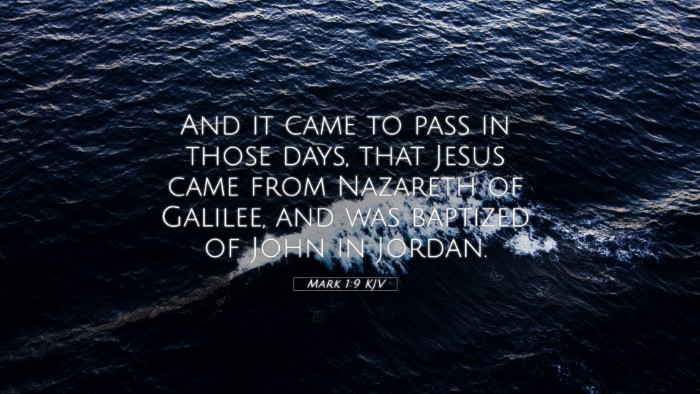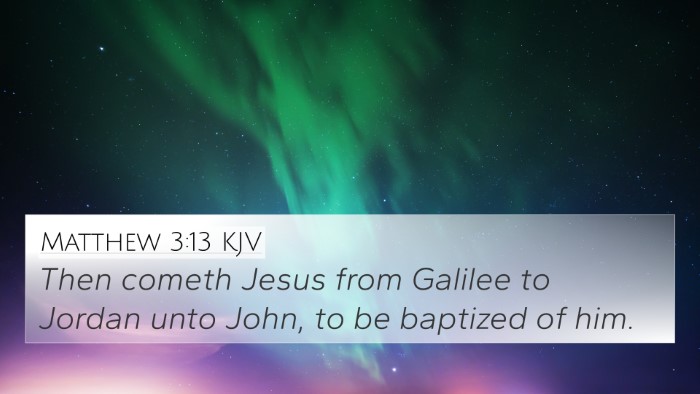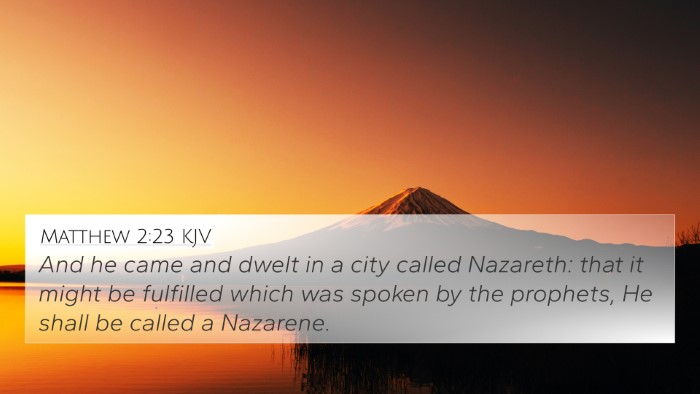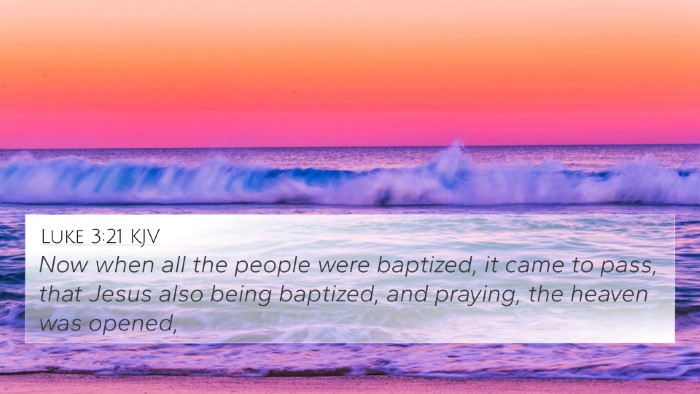Insights on Mark 1:9
Mark 1:9 states: "In those days Jesus came from Nazareth of Galilee and was baptized by John in the Jordan." This verse marks a crucial event in the life of Jesus, as it signifies the beginning of His public ministry. The baptism by John the Baptist serves as a pivotal moment where Jesus publicly identifies with humanity in His mission of salvation.
Combined Interpretations from Public Domain Commentaries
The writings of Matthew Henry, Albert Barnes, and Adam Clarke provide profound insights into this verse, which can enhance our understanding of its context and meaning.
Matthew Henry's Commentary
Matthew Henry emphasizes the significance of Jesus' baptism. He notes that Jesus came specifically from Nazareth, a location that reflects His humble beginnings. The act of being baptized by John symbolizes His willingness to fulfill all righteousness, as He was not in need of repentance. Henry also points out that Jesus' baptism was a moment of divine approval, setting the stage for His upcoming ministry.
Albert Barnes' Commentary
Albert Barnes highlights that Jesus' baptism represents a key transition in His life. He discusses the importance of the location, the Jordan River, as it is symbolic of God's work and deliverance throughout history. Barnes notes that John was a recognized prophet and that Jesus’ choice to be baptized by him indicates a humble acknowledgment of John's ministry and its significance in preparing people for the Messiah.
Adam Clarke's Commentary
Adam Clarke provides a detailed analysis of the event surrounding Jesus’ baptism. He mentions that this act was not only a demonstration of obedience but also a preparatory step that connected Jesus to Israel's tradition of repentance. Clarke also explores the theological implications, suggesting that this event reveals Jesus' role as the Lamb of God, who takes away the sins of the world.
Bible Verse Cross-References
Mark 1:9 connects with several key Bible verses that enhance its meaning and provide a deeper theological understanding:
- Matthew 3:13-17: The parallel account of Jesus' baptism.
- Luke 3:21-22: Another Gospel's account of Jesus being baptized and receiving the Holy Spirit.
- Isaiah 40:3: A prophecy regarding John the Baptist as the forerunner of the Messiah.
- John 1:29: John the Baptist identifies Jesus as the Lamb of God.
- Romans 6:4: The symbolism of baptism representing death and resurrection.
- Hebrews 5:8: Jesus learned obedience through suffering, linking to His baptism as part of His human experience.
- Acts 10:37-38: Peter recounts the ministry of Jesus after His baptism by John.
Thematic Bible Verse Connections
This verse also prompts numerous thematic connections throughout the Bible. It lays the groundwork for understanding Jesus’ purpose and fulfilling prophecies concerning the Messiah. Through cross-referencing, we can better grasp how this singular event in the New Testament relates to broader themes in the Bible.
Connections with the Old Testament
Mark 1:9 exemplifies the continuity between the Old and New Testaments, particularly in the fulfillment of messianic prophecies. The role of John the Baptist as prophesied in Isaiah 40:3 emphasizes preparation for the coming of the Lord, creating an inter-Biblical dialogue between the two Testaments.
Theological Reflections
The themes of humility, obedience, and divine approval prevalent in Mark 1:9 resonate through multiple scriptures. For example, the concept of baptism connects with the broader narrative of purification and commitment seen throughout both Testaments, reflecting God's desire for His people to be set apart for His purposes.
Conclusion
Mark 1:9 serves not only as a key event in the synoptic Gospels but also as a theological foundation for the understanding of Jesus' mission. By examining the insights from esteemed commentaries and cross-referencing with related scriptures, we gain a fuller comprehension of how this moment shapes the narrative of Jesus’ life and ministry.
Tools for Bible Cross-Referencing
Utilizing tools for Bible cross-referencing can greatly enhance one’s study experience:
- Bible concordances allow users to find specific verses based on keywords.
- Bible cross-reference guides help facilitate connections between scriptures.
- Cross-reference Bible study methods can lead to deeper thematic insights.
Additional Resources
For those interested in further exploration of the connections between Bible verses, consider using:
- Bible reference resources available in bookstores or online.
- Comprehensive Bible cross-reference materials to assist in study.
- Inter-Biblical dialogue to see how themes resonate throughout scripture.





